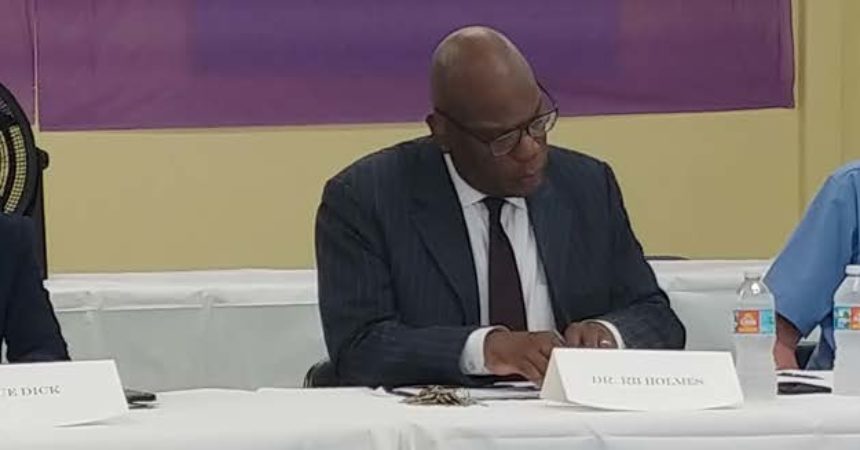
Task force looks for strategy to oust restrictive covenant

A task force formed by Rev. R. B. Holmes (center) met last week to find way to eliminate restrictive covenants in Tallahassee.
By St. Clair Murraine
Outlook staff writer
A group made up of attorneys, politicians and civic leaders has started a push to find a way to re-move restrictive covenants in deeds. After tossing around the question of taking legal or legislative action, the task force formed by Rev. R. B. Holmes, was left pondering which way to go. However, Holmes suggested that calling on local legislators could lead to eliminating the covenant that has been in place since 1930. “The time has come in this community that we would not tolerate language that is old and outdated,” Holmes said. “It is clear to me from the first task force meeting that we going to need legislative action.”
Holmes mentioned Sen. Bill Montford and state rep-resentative Loranne Ausley as the ones who could take the lead on getting bill that remove racist covenants throughout the state. Aus-ley listened to the meeting by phone, while Montford was absent as part of the 12-member task force.
The group will meet again on July 29. The task force also heard suggestions to seek city and county ordinances against racist covenants. Another suggestion was for neigh-borhood association to take the lead in a court case, but that might not be feasible since members are volun-teers, said Adner Marcelin, president of the NAACP. As recent as 2009, the NCAA fought a similar case in North Carolina and had a racist covenant re-moved, said Marcelin. He expressed concern about taking the legislative route for a resolution because other issues could be at-tached to a bill. “I’m all for what we have to do, but looking at it statewide and being realis-tic we see everything in the legislation,” he said. “We have to come with the real-ity that we have a bipartisan government and there are often sides in government that play issued that are important to everybody there.
“There is no guarantee we are going to get such a measure pass, but I say it’s worth a try. I don’t see any reason that anybody morally could not support such a measure.” The disturbing covenant was made public when attorney Anabell Dias found it in the deed for a home she intended to purchase in Betton Hills. The covenant, which is tied to utility easement, states anyone other than someone of the “Caucasian race” could not own property in some sub-divisions. Taking the issue to court would require what’s known as declaratory ac-tion and that could be time consuming, said attorney Jami Coleman. However, she seemingly is willing to take the path that the task force decides. A day after the task force meeting, Mayor John Dailey denounced the language in the covenant. The words in the covenant don’t rep-resent what Tallahassee is about, Dailey said at last Wednesday’s city commis-sion meeting. Since the issue was made public, it has caused a stir in some communities — Black and White. “I didn’t expect it to take on a life of its own imme- diately,” said Coleman, who is representing Dias.
“I’m in it for the long haul. I do want to see a resolution (because) I owe that to my children to make sure that they don’t experience inferiority because of their race.” While the covenant was discovered in Betton Hills, Coleman suspects that there are other Tallahassee neighborhoods with deed that have the same language. “What we are seeing is other communities have this repulsive language in their neighborhoods,” Coleman said. “I don’t just want to fix this particular segment of our community. I want to see if we could resolve this for all of our communities.”
Larry Rivers, a FAMU history professor and Betton Hills resident, said racist covenants have deep roots. He said the restrictive language became pop-ular when Blacks were migrated to the north. He made a point of mention-ing that from 1932 to 1962 Whites owned 98 percent of all mortgages. Restrictive covenants were ruled unconstitution-al in 1948, although it remains on deed today. “This is not something that was peculiar to Florida,” Rivers said. “It was all over the United States.” Michael Brezin, president of Betton Hills Neigh-borhood Association, said most people didn’t know about the covenant. Some residents felt that public outcry over the language was directed to them, he said. However, he was reminded at the meeting that the public reaction isn’t directed to the neighborhood but the covenant instead.
“I really appreciated the comment being made here at this meeting,” Brezin said. “People have been feeling somewhat threatened and misrepresented. I think the statement here today was a great step forward that people understand it’s not the people so much; it’s the historical covenant.” Calling the covenant intolerable, Sue Dick, president of the Greater Tallahassee Chamber of Commerce, expressed concern that the issue could have far reaching affect on the local economy.
“I think it’s a ripple effect,” she said. “Not only are you talking about some-thing that is offensive, but not tolerable. From a historic perspective we need to try to litigate that and get rid of it. “Credit to Betton Hills for really stepping forward and saying we are going to fix this. I think the rest of the Tallahassee community should follow suit and eliminate this language from our community.”







